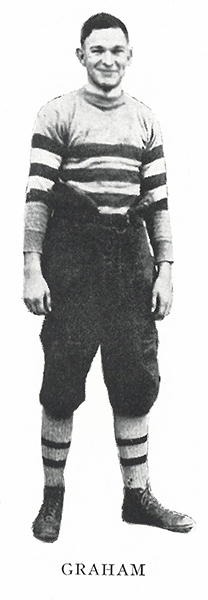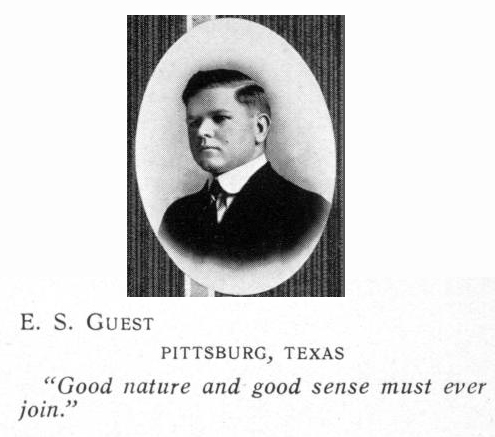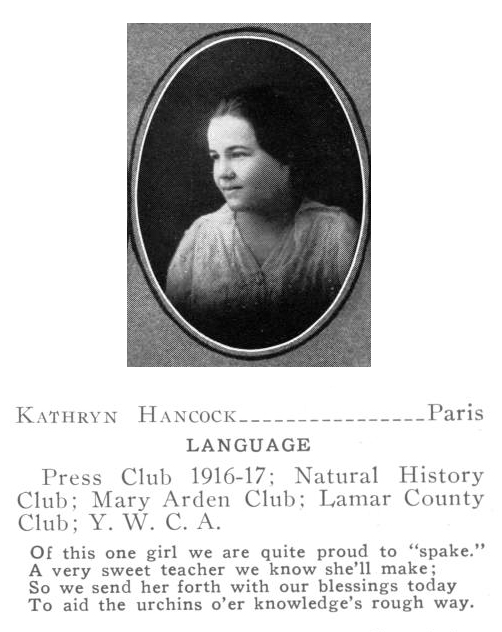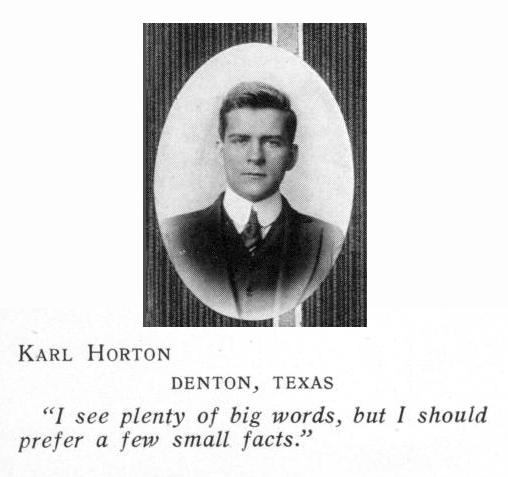UNT's First Degrees
100 years ago, five 1919 graduates made UNT history.
May 9, 2019
It was a rainy Monday morning in Denton and the scheduled speaker wasn't able to attend,
but the future of North Texas State Normal College was shining bright. It was spring
commencement, June 2, 1919, and in the Main Building’s auditorium, the college was
about to award the first four-year bachelor’s degrees in its history.

Soldiers in the Student Army Training Corps, 1919 Yucca
The ceremony marked the end of a school year that had seen more than its share of disruption. In September 1918, as the Yucca yearbook recalled, “Everyone was guessing wildly -- in every sense of the word -- as to what the enrollment would be, since the war was at its height and since there was to be a baby army in the very midst of us.”
That “baby army,” the Student Army Training Corps, was organized to help prepare officers for the war while they completed their studies. That required building barracks on campus, adjusting schedules for training and classes, and turning the president's office into the commander's office. But the armistice was signed in November, the SATC was disbanded, and the school’s enrollment -- 1,136 -- was the third-highest in its history to that point.
We bid God-speed to the five noble pioneers who with loyalty unshaken by war or drouth
or the lure of well-trodden paths, forged ahead through the virgin wilderness and
blazed a trail which countless others in the coming years will follow.
W.H. Bruce
So commencement activities that spring were celebrated with real thanksgiving. Events included a Swing Out Day in honor of the first degree graduates, featuring athletic contests, a baseball game with Decatur Baptist College, an outdoor band concert, the crowning of the May Queen and a mock graduation with children from the Training School made up to look like the degree recipients. Also on the schedule for commencement week were the annual senior class play, an operetta, a patriotic pageant, a community chorus concert and a baccalaureate sermon, along with recitals, exhibits, banquets and receptions.
The historic commencement ceremony began at 10 a.m. June 2. According to the Campus Chat, after the faculty and graduate processional, the program opened with a solo by music teacher Lillian Parrill and a speech by President W.H. Bruce. He was filling in for the Hon. J.M. Allderdice of Waxahachie who had to cancel. Graduates of the Training School received their diplomas first, followed by 400 students receiving first- and second-grade certificates and 100 more receiving permanent certificates and Normal diplomas. These prepared teachers for elementary schools or further university work and were the equivalent of two-year degrees.
Then came the stars of the hour, the five graduates in caps and gowns. After much debate, the state had authorized the teachers colleges to offer four-year bachelor’s degrees in education, preparing teachers for any grade, and these students had now completed that work. One earned a Bachelor of Science and the rest Bachelor of Arts degrees, which required foreign language study.

1918 Yucca
WYNNE B. GRAHAM
First alphabetically came the popular Wynne B. Graham, whose mother had engineered the family’s move from cattle-trail-rough Roanoke to Denton in 1904 so her sons could receive a good education.
Wynne’s younger brother, Floyd, would become a legendary fixture on campus -- a band leader and music professor better known as ’Fessor Graham, who organized the college's popular Saturday Night Stage Shows for decades.
At North Texas, Wynne was a star athlete in football and basketball, president of the senior class, associate editor of the yearbook and a member of the Press Club and Reagan Literary Society. He also had been a top sergeant and instructor in the Student Army Training Corps.
After graduation, he taught and coached in Denton, McKinney and Denison before becoming athletic director and coach at what is now Southeastern Oklahoma State University in Durant.
In the early 1930s, he and his wife moved to Oklahoma City, where he had a long career as a teacher and junior high school principal. He died there at the age of 73 and is buried in Denison.

1916 Yucca
E.S. GUEST
Next came E.S. Guest from Pittsburg. His initials stood for "Eulysse Simpson," a full name he seems to have rarely used. He was a football player known for driving a King car around campus and was called the “most engaged man in school,” marrying a few months after graduation. He was a member of the Lee Literary Society, the Oratorical Association, the Athletic Association and the YMCA.
He earned the lone B.S. degree at the ceremony and was first a principal, science teacher and coach in Rockdale and Pittsburg. After serving in the U.S. Marine Corps during World War II, he taught chemistry at Brazosport High School and at Devers, near Liberty. He died in Liberty at the age of 67.
At least one other member of the Guest family attended North Texas. His brother Cecil was a junior studying agriculture in 1917-18.

1917 Yucca
KATHRYN HANCOCK
The first woman to receive her North Texas degree was Kathryn Hancock. She had deep roots in Paris, Texas, a town founded by her great-grandfather. Called the “classiest girl in school,” she was a member of the Press Club, the Natural History Club, the Mary Arden literary society and the YWCA and served as secretary of the Student Publications Council.
She taught at Cooper and Weatherford and then taught Latin and algebra at Paris High School before her marriage made her ineligible to teach there. As Mrs. Gothard, she taught at smaller schools in Blossom and Pattonville, also serving as principal, before returning to Paris High School from 1945 to 1960, teaching English, algebra and Spanish.
A 1960 Paris News article, written upon her retirement, says she was known for a little red stick she used to “tap out the answers to a math problem or the strong points of a reprimand.” Students also remembered her “frequent pleasant comments” as they passed her classroom. She died in Paris at the age of 90.

1918 Yucca
EVA VICTORIA HATCH
The fourth degree graduate, Eva Victoria Hatch, moved to Denton from Arlington. At North Texas, she was a member of the Student Publications Council, the Mary Ardens, the Lillie Bruce Dramatic Club, the YWCA, the Press Club, the Omega Literary Society, the Choral Club and The Scribes.
She first taught high school in Wichita Falls and Denton. In 1931, as Eva Hatch Mark, she was in the first class to receive master’s degrees at what is now Texas Woman's University, and she served on the English faculty there for many years. She died in San Antonio at the age of 89 and is buried in the I.O.O.F. Cemetery in Denton.
Her son, the late Dewey Mark (’43, ’47 M.S.), was one of the youngest degree recipients from North Texas when he earned his bachelor’s degree in chemistry at age 18 and added a master’s in chemistry at age 22 after serving in the U.S. Navy. He retired in 1990 as president of Diamond Shamrock.

1916 Yucca
KARL P. HORTON
The final graduate, Karl P. Horton, was born in Corsicana and lived in Joshua before moving to Denton. He had been a sergeant in the Student Army Training Corps, president of the Reagan Literary Society, and vice president of the senior college class and the YMCA. He also was a member of the Lillie Bruce Dramatic Club, where he was known for playing comedic roles.
He taught high school in Fort Worth before beginning a career in construction, helping build tunnels, aqueducts and dams in states including Massachusetts, New York and Arkansas. He later worked for the Biltmore Hotel in Sacramento, California, before moving back to Texas to join family in Hereford. He died at the age of 70 and is buried in Mountainair, New Mexico.
The Campus Chat reported that the president addressed each of the five graduates personally, “in a few well chosen and appropriate words,” and after the ceremony and some announcements, “there was a general rush to congratulate the fortunate ones, bid hasty farewells to friends and depart for home.”
Bruce called the students trail blazers whom countless others would follow, and he was not wrong. UNT has awarded more than 300,000 degrees -- at the bachelor’s, master’s and doctoral levels -- since those first five graduates paved the way 100 years ago.